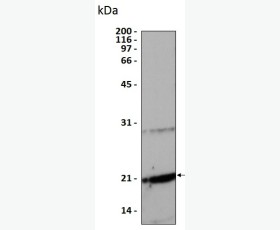Recombinant Human Noggin/NOG
| Product name: | Recombinant Human Noggin/NOG |
| Source: | Human Cells |
| Purity: | Greater than 95% as determined by reducing SDS-PAGE. |
| Buffer Formulation: | Lyophilized from a 0.2 μm filtered solution of 20mM PB,500mM NaCl,2mM EDTA,pH7.4. |
| Applications: | Applications:SDS-PAGE; WB; ELISA; IP. |
| Storage: | Avoid repeated freeze/thaw cycles. Store at 2-8 oC for one month. Aliquot and store at -80 oC for 12 months. |
| UOM: | 100ug/50ug/200ug/1mg/1g |
| Source | Human Cells |
| Description | Recombinant Human Noggin is produced by our Mammalian expression system and the target gene encoding Gln28-Cys232 is expressed with a 8His-Flag tag at the N-terminus. |
| Names | Noggin; NOG |
| Accession # | Q13253 |
| Formulation | Lyophilized from a 0.2 μm filtered solution of 20mM PB,500mM NaCl,2mM EDTA,pH7.4. |
| Shipping |
The product is shipped at ambient temperature. |
| Reconstitution |
Always centrifuge tubes before opening. Do not mix by vortex or pipetting. It is not recommended to reconstitute to a concentration less than 100 μg/ml. Dissolve the lyophilized protein in ddH2O. Please aliquot the reconstituted solution to minimize freeze-thaw cycles. |
| Storage |
Lyophilized protein should be stored at < -20°C, though stable at room temperature for 3 weeks. Reconstituted protein solution can be stored at 4-7°C for 2-7 days. Aliquots of reconstituted samples are stable at < -20°C for 3 months. |
| Purity |
Greater than 95% as determined by reducing SDS-PAGE. |
| Endotoxin | Less than 0.1 ng/µg (1 IEU/µg) as determined by LAL test. |
| Amino Acid Sequence |
HHHHHHHHDYKDDDDKQHYLHIRPAPSDNLPLVDLIEHPDPIFDPKEKDLNETLLRSLLGGHYDP GFMATSPPEDRPGGGGGAAGGAEDLAELDQLLRQRPSGAMPSEIKGLEFSEGLAQGKKQRLSKKL RRKLQMWLWSQTFCPVLYAWNDLGSRFWPRYVKVGSCFSKRSCSVPEGMVCKPSKSVHLTVLRWR CQRRGGQRCGWIPIQYPIISECKCSC
|
| Background | Noggin is a secreted homodimeric glycoprotein that is an antagonist of bone morphogenetic proteins (BMPs). Mature Human Noggin contains an N-terminal acidic region, a central basic heparin-binding segment and a C-terminal cysteine-knot structure. Noggin is very highly conserved among vertebrates, such that mature human Noggin shares 99%, 99%, 98%, 97% and 89% aa sequence identity with mouse, rat bovine, equine and chicken Noggin, respectively. Secreted Noggin probably remains close to the cell surface due to its binding of heparin-containing proteoglycans. Noggin binds some BMPs such as BMP4 with high affinity and others such as BMP7 with lower affinity. It antagonizes BMP bioactivities by blocking epitopes on BMPs that are needed for binding to both type I and type II receptors. Noggin is expressed in defined areas of the adult central nervous system and peripheral tissues such as lung, skeletal muscle and skin. During culture of human embryonic stem cells (hESC) or neural stem cells under certain conditions, addition of Noggin to antagonize BMP activity may allow stem cells to proliferate while maintaining their undifferentiated state, or alternatively, to differentiate into dopaminergic neurons. |














